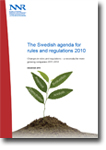The Swedish agenda for rules and regulations 2010
 |
The need for regulatory reform recurs again and again in surveys where business owners are asked about the barriers they see to the expansion of their business. The governments in power during the last two parliaments chose to try to meet the requests from businesses primarily by focusing on what are known as administrative burdens.
During the last two parliaments, many important steps have been taken to make rules and regulations more cost-effective. Examples of this are the introduction of a uniform impact assessment model and the establishment |
of the Better Regulation Council. Furthermore, the government has measured administrative burdens and implemented a large number of measures to reduce these burdens. A reduction of 3.4 per cent has been achieved according to the wording of the regulations in January 2010. NNR’s findings are that there is still a need for a change of approach regarding how different inquiries, the government and state agencies present proposals for new and amended rules and regulations. There is also room for improvement as regards how the public administration organises and carries out its work of reforming different regulatory systems for businesses within the framework of the government’s stated ambitions for simplification.
We based this report on a survey called the “Regulation Barometer 2010” in which about 600 business owners answered a number of questions relating to regulation. The questions concern everything from local regulatory supervision and burdensome reporting requirements to issues relating to the regulatory system inhibiting business growth. This survey, and NNR’s follow-up of businesses’ total costs of regulation from last spring, enables us to conclude that 73 per cent of businesses have not noticed any significant difference or any reduction in regulatory costs. It is probably difficult to pick out any single explanation for this; rather the answer must be sought on a wider basis. For instance, the wrong types of problems may have been tackled, there may be a delay before proposed EU directives come into force, or businesses responding to the survey may not have come into contact with the regulatory system since it was reformed. The reason may also be that the proposals have not gone far enough for business to have noticed any actual difference.
Like earlier surveys, the Regulation Barometer 2010 shows that other types of measures are needed to address the issues that businesses see a need to change and improve. With this in mind, NNR makes the following proposals for action to be taken:
• The changes that are made to the existing regulatory system must be those demanded by businesses in Sweden.
• When considering new or changed regulations, choose the option that involves the lowest costs for the concerned businesses.
• A broader systematic discussion of regulations and the effects.
• Evaluate ex post what effects different regulations have had.
• Undertake and publish national impact assessments (IAs) of different EU proposals that are to be negotiated within the European Union
